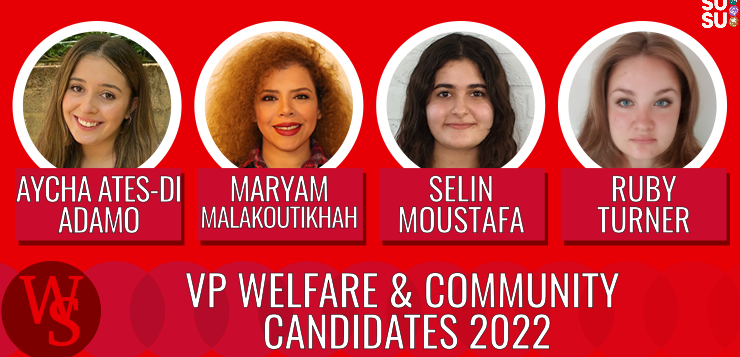- Interview with Zoe Chapple: VP Activities Candidate
- Interview with Rishi-Nayan Varodaria: Union President Candidate
- Interview with Parth Pandya: VP Education and Democracy Candidate
- Interview with Samuel Pegg: VP Activities Candidate
- Interview with Oliver Murray: Union President Candidate
- Interview with Xiao ‘Veronica’ Wang: VP Education and Democracy Candidate
- Interview with Benedict Madan: Union President Candidate
- RUMOUR HAS IT… 2022 UNION ELECTIONS RUMOURED SABBATICAL OFFICER CANDIDATES
- Interview with Jamie Biltcliffe: VP Education and Democracy Candidate
- Interview with Holly Denton: VP Education and Democracy Candidate
- Interview with Emily Bastable: VP Education and Democracy Candidate
- Spring Elections 2022 Candidates Revealed
- There’s still time to nominate yourself for a SUSU leadership role
- Interview with Harry Bull: Union President Candidate
- Interview with Ryan Couchman-Sawyer: VP Education and Democracy Candidate
- Interview with Selin Moustafa: VP Welfare and Community Candidate
- Interview with Ruby Turner: VP Welfare and Community Candidate
- Interview with Aycha Ates-Di Adamo: VP Welfare and Community Candidate
- Interview with VP Sports Candidate: Casie Osbourne
- Interview with Corin Holloway: VP Activities Candidate
- SUSU Spring Elections 2022 Liveblog
Wessex Scene were able to interview Selin Moustafa about their campaign to be the next VP Welfare and Community.
Selin elected to answer these questions during an interview.
Why did you apply for the role of VP welfare and community?
I applied to the role because I did believe that there are lots of issues within the university that they are tackling, but the communication isn’t there for everybody to know that the support is there. My big push is to create better communication, so everyone who is in need and wants support can get it without having to search too hard to find it.
If you are elected, what would be your top three areas of focus?
The first one I would say is disability. I believe that the university’s policy around disability isn’t brilliant, particularly when it comes to things like extensions for learning disabilities – so expecting students to just be able to overcome it without much more support. So, I would like to lobby the university to reassess this policy because I believe it doesn’t actually allow students with chronic issues to produce their best work.
My second area that I believe needs a bit of attention is the BAME community. I believe Southampton is very white and does struggle to really push to support ethnic students, who may not be able to connect with the other ethnic minority peers. Because, again, there simply isn’t enough. Space is separate for them. I would do this by having focused events for the BAME community, so that they understand that they do have peers that they can connect with and don’t feel so isolated within university. I think being away from home for the first time for a lot of students, they’re realising that they don’t have the support of their local community, of their parents to reinforce the culture and a left struggling to really get a sense of identity in their time here. So it’s about really embracing their backgrounds, which would be great for everybody, including the white students. It’s something to get everyone involved in.
The final area that I think needs a little bit extra work is feminist movements. Of course, we do have a lot of stuff but, I think linking with the BAME community, I think my point is to creating sectionality to make sure that everybody can get a sense of belonging and connect with the feminist movement and feel that their issues as women are understood and that they feel safe because it’s come to my attention that a lot of women, over men, still feel not very safe in all the spaces at the university and outside of the university. A lot more focus needs to be put on how we make people feel comfortable and secure when they go out. For example, not risk being spiked and issues like that.
What’s something that SUSU provides that you like and what is something that you would like to change?
I do like the report and support service. I think that is a brilliant service and I think it’s quite easy step by step and you get provided somebody to speak to and I think it’s really important to have that one-on-one communication but I do think we need a little bit more in preventative action.
So when it comes to before you go on a night out or before you go to a social, already knowing the information before a situation happens, of course the aim is to stop these situations happening how to make sure everyone is safe for a lot of people, this is the first time they’re experiencing even being drunk or being out alone.
So we need clear access to step by step, how to keep people safe, how to keep them from coming into harm’s way and if something does happen how to stop it, the second that they notice there is an issue and I would do that by putting guidelines and information, maybe on the Southampton app.
So people just feel a bit more comfortable and ready to go out and before anything gets the chance to happen.
So it’s largely about access to those resources.
Yeah, information definitely it’s about and I think generally, we just need better access and alternative forms of access outside of things like emails because sometimes that’s a bit overwhelming when you get lots of emails and you struggle to actually read them all, maybe even go further to say, physical boards like in the library where we could have posters.
Just so if you want to be away from your phone or computer, you can just go and have a look and see what’s available without reading through a lot of information.
How would you offer support to students who hold welfare positions within societies? As they are volunteers, who usually go far and beyond their role requirements to support fellow students?
I think the way that we go about this is connecting with charities that specialise in this. So, we have Yellow Doors which the university does work with. And, of course, you don’t want to overwhelm the welfare officers, but I think it’s about making sure that the information that they are given is very clear.
There are lots of step-by-step guides and really making use of the resources available to us as a university and focusing on what the wider community in Southampton can provide us, so it’s fully fleshed out and that everyone feels confident within their role and not face a challenge that they feel completely unable to deal with.
What do you currently identify as concerns with the current role of VP Welfare and Community? How would you address these?
I think it is a challenging role because every situation that people go through is very different and welfare tackles people’s identities, people’s sense of safety, and their mental health, and everyone is very different in that.
I think the way that we can improve on the role within this sector is making sure we focus on working with the other officers. It’s about making sure that it’s not a separate issue that within every club, within every society, that people feel that they will always be supported and you don’t have to go to very formal places to receive help or to get friendship in your community to make things a bit more lighthearted, a bit more accessible, to everyone without trying.
It’s a bit intimidating sometimes to get help but I think by working with other branches, such as sports, to improve people’s mental well-being. Then we would be able to be more effective rather than very separate issues and very structured issues. It’s about breaking beyond the boundaries of what we would consider community issues and welfare issues.
You mentioned less formal ways of getting that information out there. Can you suggest some?
I think we need to make better use of the spaces within the university. We have really great buildings and wide spaces in the red brick as well and stands and posters and things that just catch people’s attention when you see it. Perhaps even a suggestion box and something that people feel like it can be anonymous and you don’t have to talk to someone because for some people it’s much easier to talk to a person and it’s important to have forum meetings where we can talk to people and people can bring up their suggestions.
However, not everyone feels comfortable doing that and they might have an idea and feel a bit scared and then not really sure where to go. So again, make use of something like the library where you can have a little suggestion box and maybe it won’t be used a lot. But when it comes down to people’s health or feeling isolated, we need to provide lots of smaller solutions rather than saying, ‘this is the only way you can get your ideas across’. So something like a suggestion box would be ideal as well as forums and open, perhaps even online, stuff for people that might not be able to make it in person. So it’s about options rather than this is the definite solution.
What other support do you propose for disabled students beside recording lectures?
We need more uniformity within lectures. I think, sometimes you go to a lecture and it’s brilliant and it caters to all your needs. And sometimes a lecture has a completely different style and you have no way of accessing the information properly and I think that needs to be clear guidelines. In terms of learning disabilities, then it would be better if lecture slides are posted and make sure that they actually have enough information for them to be useful because often they are just pictures, and I appreciate that different lectures have different styles, but if you are struggling to follow, it’s nice to have a place to constantly go back to.
And also, I’ve heard within the university, not all lecture halls are even accessible to wheelchair users and that is a terrible issue that we really need to address. It could be something as simple as putting on the back row a bench for the students to pull up to.
Because at the moment, there are some students who are forced to sit at the back of a lecture hall and don’t even have a desk to work at and that’s not acceptable. They are a valuable part of the university and they deserve to have the same learning experience as everyone else.
So it’s making sure that it’s universal, every department has great resources, there are great lecture halls and stuff, but it is important that it is widespread and that students aren’t left in this situation where they are not accessing the right support from subject to subject or module or module.
Wessex Scene attempted to contact Maryam Malakoutikhah but unfortunately were not able to set up an interview.




